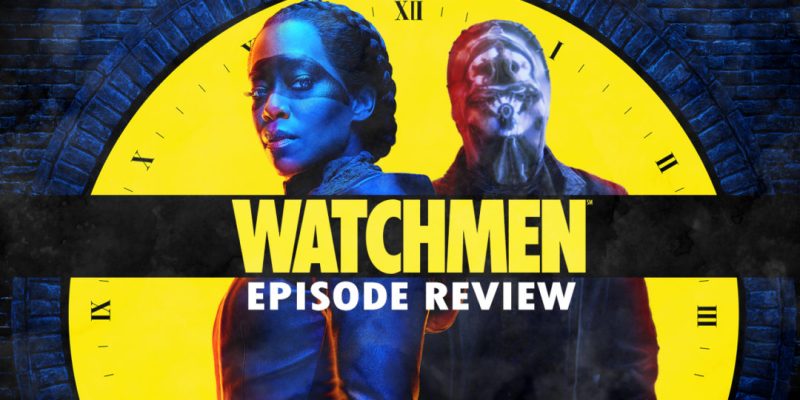This review contains spoilers for Watchmen, episode 7, “An Almost Religious Awe.”
Earlier this week, I talked to the owner of my local comic book store for a good half hour about how things were going for each of us. Eventually the conversation steered towards television, and we both started to talk about Watchmen. He was absolutely thrilled that Watchmen, unlike most other comic book movies or TV shows, felt wholly original. It wasn’t retreading the original story, but instead adding something substantial to the mythos and being its own entity.
On that front, I agree with him. Watchmen has certainly been unique and unafraid to tell its own story that both honors and expands on the original comic book, whether it be from Hooded Justice’s introduction last episode or examining the world post-Ozymandias’ experiment in episode 5. “An Almost Religious Awe” continues that streak of originality, but parts of the show are starting to collapse under their own weight as we approach the finale.
Surprisingly, this episode dealt primarily with a character who has always been part of the show yet never physically appeared in it: Dr. Manhattan. It’s strange that a show interested in exploring the world post-11/2 had only mentioned Dr. Manhattan a few brief times. Now, we see that the people of Vietnam have made him into a religious figure of sorts, with others all across the world offering that same level of reverence towards him. Then in a twist that I’m sure few people saw coming, Lady Trieu (Hong Chau) reveals that not only is Dr. Manhattan on Earth, but he’s in Tulsa. What’s more, Angela (Regina King) knows this because her husband Cal (played by Yahya Abdul-Mateen II from Aquaman) is actually an amnesiac Dr. Manhattan.

There’s definitely a lot to unpack there, but what’s most intriguing about this revelation doesn’t have to do with how this changes the relationship between Angela and Cal, but what it says about race. In the same way that Hooded Justice, the first-ever vigilante, was a black man, now we have Dr. Manhattan returning as a black man. To echo a quote from the original series — God exists, and he’s black.
The emphasis on race has been slowly but steadily increasing over the past few weeks while the examination on police brutality and societal trauma has regressed, but this development sparks some fascinating discussions. Watchmen has been on a campaign to subvert all of our expectations regarding what we knew about the original comic, but while the Hooded Justice revelation from last week makes sense and forces readers to reexamine the original comic, the Dr. Manhattan revelation doesn’t hit as hard. Thematically, it ties in to what the 7th Cavalry has been up to for the past couple of weeks, but unless the next episode can offer up a compelling reason why Dr. Manhattan lost his memory and took up the guise of Cal, it feels more like a shocking twist for the sake of shocking twists.
Speaking of the Cavalry, once Agent Blake (Jean Smart) confronts Jane Crawford (Frances Fisher) about Judd’s connection to Cyclops, both she and Senator Keene (James Wolk) reveal their entire plan to her. The Cavalry is actually Cyclops and Keene’s plan to work together with Judd, who is also a Cyclops member, to use the police and the Cavalry to force all members of both sides to wear masks in order for Cyclops to conduct their true goal in secret. If everyone is wearing a mask, in their mind it will be impossible for anyone to tell who’s on whose side. The plan is, thanks to the recontextualizing of Dr. Manhattan this week, to kill God and take his place by recreating the accident that gave Jon Osterman his powers. In other words, the white supremacists’ goal is to kill a black man for their own personal gain.
Thanks to the ever so subtle defense from Keene of “I’m not racist, but…” for his actions, there’s no doubt whatsoever that Watchmen is moving beyond examining African Americans and their relationship with the police to African Americans and their relationship with government. The boogeymen aren’t the cops whose identity you can’t see, but members of the government that are not only racist no matter how fervently they try to deny it, but are actively seeking to exploit African Americans for their own benefit. In this case, they’re wishing to kill the one person that everyone around the world cares about and adores in order to further their own agenda. Like most delusional cults, they believe they’re acting for the benefit of the world when in actuality they only care for themselves.

The concept is compelling, but it’s going to take a lot for Keene, who looks to be our main antagonist moving forward, to separate himself from being just another politician looking to exploit people for their own personal gain. Even Laurie feels exhausted by this, jokingly explaining all of Keene’s backstory before he’s able to.
Another issue is how Ozymandias scenes continue to interrupt the pace of episodes and seem to exist in their own strange little bubble that’s so far removed from the main events that, even if there is some massive twist on how fundamental these moments are to the central narrative, it’s far too late for me. I don’t care that Ozymandias (Jeremy Irons) has been on trial for a year. I don’t care that the Game Warden is played by the same actor as Mr. Phillips (Tom Mison). I don’t care that pigs were brought into the court to render Ozymandias a guilty verdict. At best, they feel like padding. At worst, they make me question why I ever bothered to invest any time in these sections.
In fact, this episode seems very interested in throwing surreal images and concepts at the viewer with little-to-no context. Lady Trieu’s daughter is actually something else! Will’s memories were being fed into an elephant! Ozymandias’ defense is his farting! These aren’t bad things, mind you, but I’m not too sure if these moments fit into the tone set by the series up to this point. We’ve gotten strange moments before, like raining squids in the premiere, but they were always grounded in some logical explanation in the Watchmen universe. Now strange things feel like they’re happening for no better reason than, “Why not?”
When looking at it as a whole, “An Almost Religious Awe” is still one of the better episodes of the series. It’s nowhere near as good as last episode, but then again, few episodes of any TV show ever can be. Now we know where everyone’s true allegiances are, and we’ll have next week to clean up after the Manhattan revelation. We still have a few wild cards on the table, like a now missing Looking Glass (Tim Blake Nelson), but everyone is gearing up for some good old-fashioned deicide. Should be an interesting turn of events next week.
